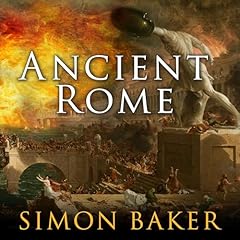
The Fate of Rome
Climate, Disease, and the End of an Empire
No se pudo agregar al carrito
Add to Cart failed.
Error al Agregar a Lista de Deseos.
Error al eliminar de la lista de deseos.
Error al añadir a tu biblioteca
Error al seguir el podcast
Error al dejar de seguir el podcast
 Exclusivo para miembros Prime: ¿Nuevo en Audible? Obtén 2 audiolibros gratis con tu prueba.
Exclusivo para miembros Prime: ¿Nuevo en Audible? Obtén 2 audiolibros gratis con tu prueba.Compra ahora por $23.44
-
Narrado por:
-
Andrew Garman
-
De:
-
Kyle Harper
A sweeping new history of how climate change and disease helped bring down the Roman Empire
Here is the monumental retelling of one of the most consequential chapters of human history: the fall of the Roman Empire. The Fate of Rome is the first book to examine the catastrophic role that climate change and infectious diseases played in the collapse of Rome's power - a story of nature's triumph over human ambition.
Interweaving a grand historical narrative with cutting-edge climate science and genetic discoveries, Kyle Harper traces how the fate of Rome was decided not just by emperors, soldiers, and barbarians but also by volcanic eruptions, solar cycles, climate instability, and devastating viruses and bacteria. He takes listeners from Rome's pinnacle in the second century, when the empire seemed an invincible superpower, to its unraveling by the seventh century, when Rome was politically fragmented and materially depleted. Harper describes how the Romans were resilient in the face of enormous environmental stress, until the besieged empire could no longer withstand the combined challenges of a "little ice age" and recurrent outbreaks of bubonic plague.
A poignant reflection on humanity's intimate relationship with the environment, The Fate of Rome provides a sweeping account of how one of history's greatest civilizations encountered, endured, yet ultimately succumbed to the cumulative burden of nature's violence. The example of Rome is a timely reminder that climate change and germ evolution have shaped the world we inhabit - in ways that are surprising and profound.
Author bio: Kyle Harper is professor of classics and letters and senior vice president and provost at the University of Oklahoma. He is the author of Slavery in the Late Roman World, AD 275-425 and From Shame to Sin: The Christian Transformation of Sexual Morality in Late Antiquity. He lives in Norman, Oklahoma.
©2017 Princeton University Press (P)2017 Recorded BooksLos oyentes también disfrutaron:




















Las personas que vieron esto también vieron:


















Just a terrific book. Every chapter is enlightening and substantive.
Se ha producido un error. Vuelve a intentarlo dentro de unos minutos.
Rating Change
Se ha producido un error. Vuelve a intentarlo dentro de unos minutos.
excellent
Se ha producido un error. Vuelve a intentarlo dentro de unos minutos.
Captivating story
Se ha producido un error. Vuelve a intentarlo dentro de unos minutos.
While I enjoyed the narration and listened to the end, I decided half way through that this book merits to be bought as a physical copy as well, for it contains a wealth of data the significance of which is easily lost when one doesn't see the figures written down. I think it will also be invaluable as a reference book in the future.
Indispensable reading
Se ha producido un error. Vuelve a intentarlo dentro de unos minutos.


